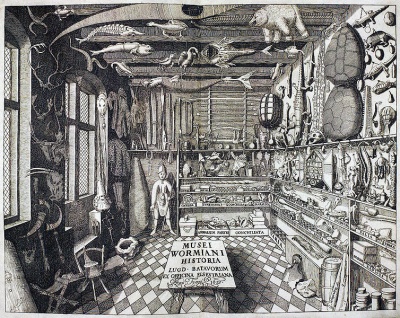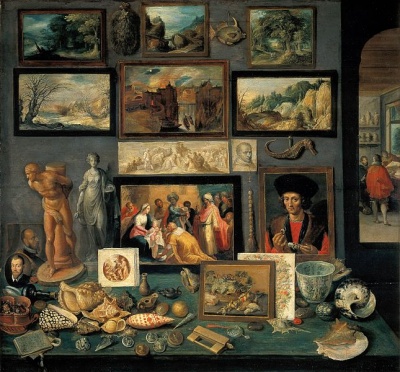User:Inge Hoonte/Notes Inge
Research Angle
My projects often function as methodologies to order information. In ordering the information, I devise systems for an intimate audience experience while aiming to provide a setting for different interpretations for the same body of knowledge. Knowledge that can be reconfigured, to provide a personal experience. Rhythm, harmony, dissonance are important. To move forward, I want to go back first and examine a few previous projects that have been on my mind as a point of departure for the coming year.
1.) COLLECTING & COMPOSING
At the moment, I'm approaching the research from the angle of the Cabinet of Curiosities / Wunderkammer. Together with the Visboeck, these collections interest me more conceptually than literally, although my apartment and perhaps my brain look a bit like this, just not as stacked to the brim. I tend to display my collection of findings and small belongings in windowsills, little alcoves, in the hallway, on the fridge, on the wall above my desk, etc. In any new dwelling, however briefly occupied, I surround myself with a selection of these items, carefully (re)arranged into various compositions to make the space mine, and create a sense of belonging. The items range from photographs I find on the street, newspaper clippings, reminders on post-it notes, to shells, little plastic figurines, porcelain dolls without a head, postcards, store-bought fawns, and once, a big stone crab. I pick them up on a trip with a friend to the beach, a trip by myself to the beach, a walk down to the park, on my way to the grocery store, at a thrift store, on the street, etc. Each time I move, I throw some things out, pack the rest up in a box, and assemble a new collage at the next place to impose a new history with my own memories. The continuity is not how long I'm in a place, but how the assembled experiences (tied to a place, time, and person) together form my 'belonging.' As with any collage, the placement of and relationship between the objects is very important.

 From wikipedia
From wikipedia
Add File:Random_Experience.jpg
I'm interested in relating this way of collecting 'stuff' to the way I document and collage my memories and experiences while creating new work. I have a tendency to work on several smaller things at once, which sometimes end up being stand-alone pieces, and other times come together in a larger performance, video vignette, radio show, series of posters, or collection of writing. In 2006, I made "Anything is Inside Everything," an 11 minute video. Originally I set out to play several independent clips on shuffle, but I ended up editing all scenes into a bit more of a linear narrative. After this I made a sound installation, worked on a documentary, wrote a short play, and ventured into online performance, while continuing to write poetry and short stories that I self-published in small booklets. I wrote an outline for a project a few years ago which I never ended up pursuing, to create an experiential environment in which various media come together to compose a narrative. I envisioned that a sound sample could be followed by a movement elsewhere in the space, and characters in the story moving in between screens, perhaps set in motion by the audience. I want to return to this idea of creating a work that is plural in its content, forms and methods, while together being one collection.
2.) CONVERSATION, DIALOG, RELATING, EXPERIENCE
I seem to have a need to be in a constant dialog with people, even when I can't establish a connection, such as in my letters to Phil Agre, and in a previous series of notes I wrote to people I dreamed about (as if we'd experienced it together, which in a way, we had). I can get lost in traveling in someone's brain and personality, picking pieces from someone's character, draw them to me, make them part of me, carry them with me long after they're gone, and recomposing the experience we have together in getting to know each other, however briefly. I'm talking about quirky, positive experiences of relating. Being yourself, moments of intimacy. Relating. Creating a platform for the transaction of experience.
Things to Ponder Over
- I think this might become a rather intimate setting, to be experienced by one person or a small group at a time. Recommendations of work I should look at, read, go to? People I should meet, talk to, contact? What does this recall?
- Test, rehearse iterations.
- Make work that is multi-faceted, well composed, not a mess. What should I look out for? Examples of what you've seen that didn't work.
- Get it out of my brain, out of the computer, off the wiki, out of the building, into the world. Bring it back again.
Analyze Work Methodologies, Relation to Previous Work
- Combine digital and physical in one space. Curiosity cabinet of storytelling, videography, computing, poetry, sound art, performance. Collection of experiences.
- Research on Visboeck, Aedriaan Coenen --> curiosity cabinet / collage of various bits of information and interests, contained in one form, in his case, the book / collector of curiosities. Inspired by the fact that he poured the contents of his brain, however scrambled, together, real or fictive onto the pages of the book. All presented as equal material, no distinction.
- The Heart - Owner's Manual -> adapt existing format (user manual) to new context
- Random Personalized Exhibition Experience v5.10.11 -> random connections, database that I composed
- 11:11:11 = currently developing -> play with random input and database, push physical space into online space.
- Dear Philip E. Agre = letter, lecture -> relating, storytelling, connecting stories to theory
- Anything is Inside Everything ->
- A Story that Relates -> in this 10 minute sound piece and text-based performance, I worked together with poet Emily Anderson. We wrote together, and edited each others' work. The material we felt most strongly about ended up being three parts / chapters of the piece, related to each other in content (relating to people when ill), and announced by the sentence "Oh I have a story that relates"
- First -> radio show about first meeting people. Prerecorded material interspersed with live interviews with couples who told me about what they thought of each other when they met for the first time. This is something I've been wanting to make a larger collection of for a while.
- Eavesdropping -> thesis work in undergrad, 2002. Sound installation with short audio clips, eavesdropped conversations in public space. By bringing them into a gallery setting, the audience is eavesdropping on people that are not present in the space. This was inspired by mobile phones that started leak personal information into public space and how this affected communal use of this space.
- Project with Michelle Tupko for LowLives, online performance via UStream -> Being together while physically apart.
- I was 28 in 1923 -> collection of short stories, written with filmmaker Noe Kidder. About intimacy, longing.
- Collection of short poetry over past years, smaller projects
- Rotterdam Waterway Squid -> erase the land, expose the water ways
- xo -> composing with email content
- Clapping Music for Animals -> finding a way to compose with code, turn variables into symbols/concepts that can't be performed in the terminal, but can be conceptually explored once you pull them into a different context.
- Open Poetry nights, 1st Wed at the Schouw --> rehearse and experiment with various ways of performing my texts in front of a small audience.
TO DO
- Wrap up Agre.
Inspiration
Harry Partch --> harmony, dissonance. "Music should be tied to the human speaking voice" Mid 1920s -- On the Sensations of Tone, Herman Helmholz (?). Partch saw Western twelve tone system as a conspiracy. Wanted pure intervals and pure tuning, focus on natural speech: 43 tones in a scale. Microtonality. Dropped out of music scene to travel around the US on freight trains during the depression with other hobos. He enjoyed their company because there wasn't the pressure to be important, they just 'were.' Human contact. Among them he could be himself, drink heavily without being frowned upon, and openly express his sexuality. Made no music but stored up experiences for later use. Everyday living as a creative outlet. When everyone's a stranger, you have to make a decision very fast, you learn to trust the right people. Hobos are extremely individualistic people, can't conform to society, that's why they live like this. Never stopped being an artist, kept a journal, and still designed instruments. Wrote down inflections of individuals' speech on which he later based his compositions. Heard music on the road, accents differed from town to town. Organic process. From outsider perspective: rugged, romantic.
Georges Perec --> Life, A User's Manual
Candice Breitz --> The Legend
OuLiPo
Vignettes
Aernout Mik
Spalding Gray
Disembodied Voices
"You have to tell stories, otherwise the people in it can't live on in your memory" (or something along these lines, Nullah character in Australia movie, 2008)
Gabriel Lester
Omer Fast
Elmgreen & Dragset
Biking
Parallel Narratives
Phil Niblock
Letters from friends, sending letters
Give & Receive
Ann Mertens
Look up
Six Stages of Grief
